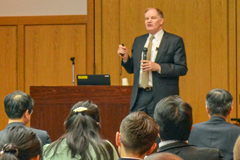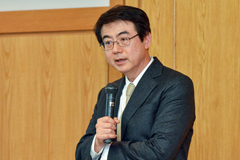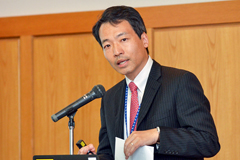Toward the Growth of Developing Countries through a Mechanism Facilitating Innovation: Discussions at a Seminar Held Jointly with the World Bank
2018.04.12
On March 26, 2018, the World Bank and the JICA Research Institute (JICA-RI) jointly hosted the seminar "The Innovation Paradox: Developing-Country Capabilities and the Unrealized Promise of Technological Catch-Up."
The World Bank issued a report titled "The Innovation Paradox: Developing-Country Capabilities and the Unrealized Promise of Technological Catch-Up" in October 2017. William E. Maloney, Chief Economist for the Equitable Growth, Finance and Institutions Group (EFI) of the World Bank Group delivered a keynote lecture at the seminar. Tetsushi Sonobe, Vice President of the National Graduate Institute for Policy Studies (GRIPS), and JICA-RI Visiting Scholar Go Shimada (Associate Professor, Shizuoka Prefectural University, at the time) were among those making comments.

William E. Maloney, Chief Economist for the Equitable Growth, Finance and Institutions Group (EFI) of the World Bank Group
First, Naohiro Kitano, JICA-RI Director at the time, and Akihiko Nishio, Director for Strategy and Operations, EFI, World Bank Group, welcomed those in attendance. Kitano expressed his expectations, saying "This report gave me the message that an important key to innovation is the quality of a company’s management. I hope we can actively discuss innovation."
Next, Maloney took the stage to deliver his keynote lecture. He said that returns on technological adoption are thought to be extremely high, yet developing countries appear to invest little, calling this the "innovation paradox." He took Chad as an example to illustrate what lies behind this paradox. Why does the government of Chad not invest part of its budget in research and development of new technology? It is because there are no engineers, marketing personnel, business environment for exporting, or financial markets. In other words, the complementary factors to back up innovation are missing, and the government finds little value in investing. And he called for the National Innovation System (NIS), a mechanism to generate innovation through interaction between the supply side, such as educational institutions providing excellent human capital who are able to conduct research and development, and the demand side, such as companies providing the demand for innovation, and the government, so that innovation can spread in such developing countries as well. He also pointed out the importance of providing incentives relating to business environment, such as competition or trade structures, and the improvement of management capabilities to make companies create innovations.
What is necessary for companies to improve the quality of their management? Maloney said, "Advanced countries may count on well-functioning education systems and business climates to ensure the accumulation of these complementary factors of production, but developing countries cannot.” However, he said developing countries then face into the dilemma of their governments’ inability to formulate such policies. Citing the case of members from the Satsuma and Choshu clans studying abroad in the U.K. at the end of Japan’s Edo Period then contributing significantly from the public sector to the modernization and industrialization of Japan, Maloney pointed out the importance of rational, effective policy which is consistent within the NIS in promoting innovation, as well as the need for the governments of developing countries to have the ability to formulate such policy.

Tetsushi Sonobe, Vice President of the National Graduate Institute for Policy Studies
He also said there are three stages to the implementation of the NIS, and presented the concept of the "Capabilities Escalator," stating that the policies to focus on differ according to the country’s current stage. "We need to create 'birds that are able to fly,' we need to create firms able to fly," he said. Firms in developing countries tend to overestimate the quality of their business management, and despite the effectiveness of consulting services, management believe they do not need to learn anything, and consulting is not fully utilized. Maloney concluded his lecture saying, with its experience implementing activities to improve productivity after World War II Japan is likely to have a lot to offer to developing countries.

JICA-RI Visiting Scholar Go Shimada
Commenting on this, Sonobe proposed further dividing of Stage 1 of the Capabilities Escalator into Type 1 and Type 2. He pointed out that for countries lacking knowledge regarding management (Type 1 countries), introduction of Kaizen — a productivity and quality improvement method — would be effective and for countries at a somewhat higher level (Type 2 countries), it would be effective to reduce entry barriers and import barriers and bring competition into the equation, which would result in improved business management. Shimada asked whether the report implied a change of the World Bank’s policy and operation on industrial policy. In addition, there were a variety of questions and opinions from those in attendance, regarding the definition of innovation and whether innovation would occur even with insufficient human capital, prompting lively discussions.
External Links

事業事前評価表(地球規模課題対応国際科学技術協力(SATREPS)).国際協力機構 地球環境部 . 防災第一チーム. 1.案件名.国 名: フィリピン共和国.

事業事前評価表(地球規模課題対応国際科学技術協力(SATREPS)).国際協力機構 地球環境部 . 防災第一チーム. 1.案件名.国 名: フィリピン共和国.

事業事前評価表(地球規模課題対応国際科学技術協力(SATREPS)).国際協力機構 地球環境部 . 防災第一チーム. 1.案件名.国 名: フィリピン共和国.

事業事前評価表(地球規模課題対応国際科学技術協力(SATREPS)).国際協力機構 地球環境部 . 防災第一チーム. 1.案件名.国 名: フィリピン共和国.

事業事前評価表(地球規模課題対応国際科学技術協力(SATREPS)).国際協力機構 地球環境部 . 防災第一チーム. 1.案件名.国 名: フィリピン共和国.
scroll